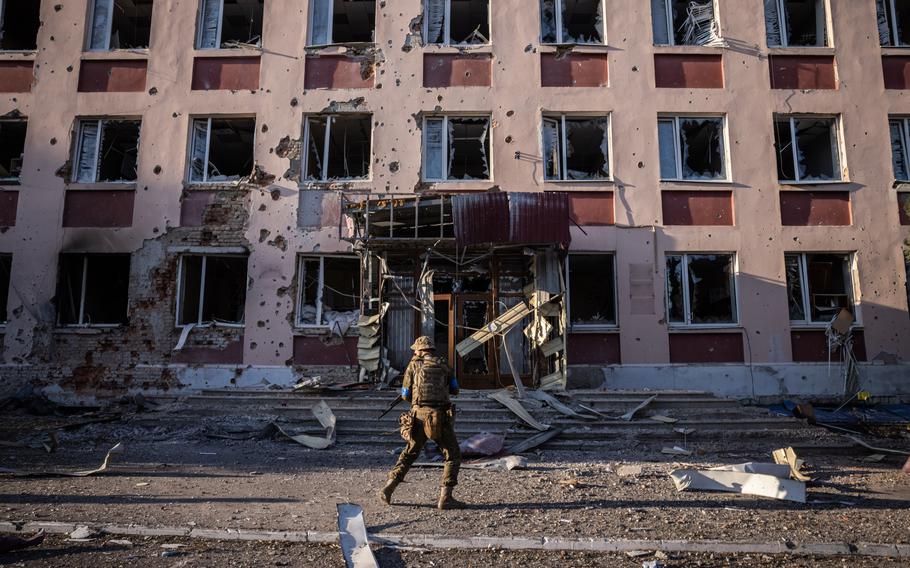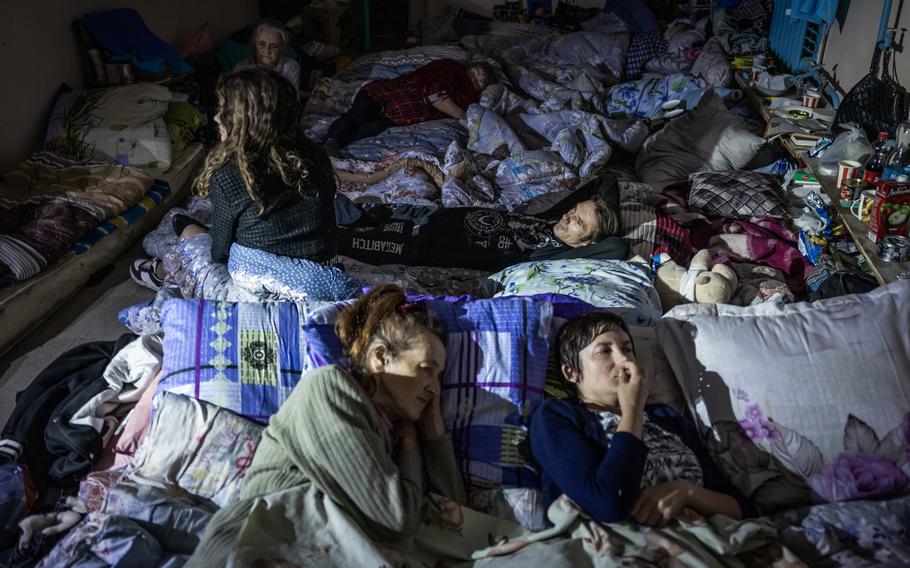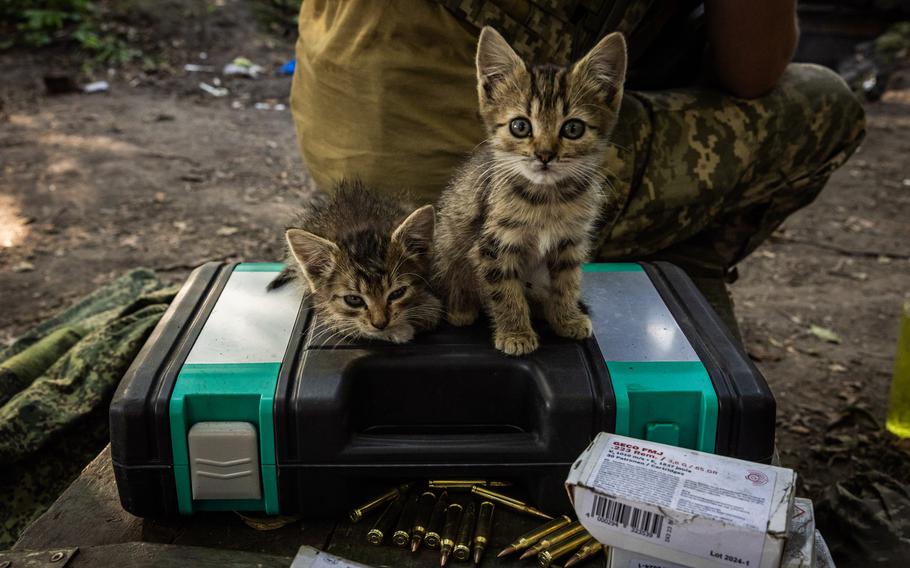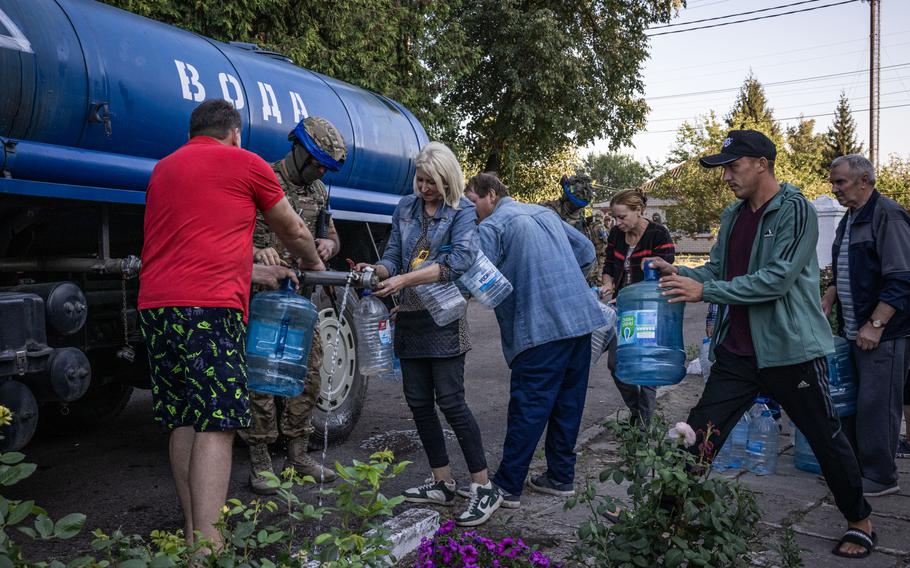Europe
In Ukraine-controlled Sudzha, stranded Russian civilians question what’s next
The Washington Post August 19, 2024

Ukrainian soldiers walk past a building hit by shrapnel in the Ukraine-controlled city of Sudzha, Russia, on Saturday. (Ed Ram/The Washington Post)
SUDZHA, Russia — The blue and yellow lines painted on two signposts at the entrance to this Russian town offered unmistakable evidence that some citizens of Russia are living under Kyiv’s control and Vladimir Putin’s war on Ukraine is really not going as planned.
On Saturday afternoon, 12 days since Ukrainian forces crossed into this Russian border region, soldiers patrolled Sudzha’s damaged streets with bright blue tape on their arms, scanning the sky for incoming drones. Graffiti covered the front of a store, renaming it “ATB,” a popular Ukrainian grocery chain. Russian flags had been removed from administration buildings, but blue and yellow Ukrainian ones were not flying.
Russian civilians - most of whom are elderly or disabled - slept on the basement floor of a former school or sat quietly in its courtyard, where troops handed them water and food.
The air reeked of smoke and death, and shrapnel and debris littered the roads. Village houses appeared largely intact, but buildings in the center of Sudzha, a town of 5,000 people, were badly damaged by bombs and shelling. Washington Post reporters escorted there by Ukrainian troops Saturday saw no evidence that Ukraine’s military had looted or attacked civilians. The dozen Russian civilians interviewed by The Post in Sudzha said they were being treated well and did not know of any residents who had been killed - but that they still want their town back under Russian control.
One older woman cried, begging for a humanitarian corridor to the Russian-controlled city of Kursk. A 91-year-old man asked Post journalists to take him with them into Ukraine to find his daughter in Kharkiv - a sign of how Putin’s invasion has tragically separated family members for years. Ukrainian soldiers were present for half of The Post’s interviews with civilians.

People sleep in the basement of a school being used as a bomb shelter in Sudzha. (Ed Ram/The Washington Post)
The way Ukrainian troops are operating in the territory and appear to be treating the people who live there reinforces official claims that Ukraine sees the goal of its offensive less as a conquest for long-term annexation and more as a negotiating tactic that will be used to pressure Russia to return occupied Ukrainian land. Still, Ukrainian forces continue to press forward and destroy critical infrastructure to prevent Russian troop advantages.
For the forces on the ground, and for many across Ukraine, the incursion is seen as a vitally important tactic to prevent Putin from trying to freeze the conflict to Ukraine’s disadvantage.
“I think this is temporary,” said Boxer, 28, a drone unit commander who helped plan the attack. He was speaking from the underground bunker inside Russia where he now lives, which just two weeks ago was home to Russian conscripts. “I think everyone, including our command, thinks this is being done to end the war.”
He is from the city of Enerhodar, which fell to Russia in March 2022.
“I hope that this operation will help us return home sooner,” he added. “Because all this is great, but I already want to go home.”
Two and a half years after Russia’s full-scale invasion of Ukraine, Kyiv’s forces launched a surprise offensive over the border into Russia’s Kursk region on Aug. 6, catching Russian troops, including many inexperienced conscripts, off-guard. Ukraine has since seized hundreds of prisoners of war and around 400 square miles of Russian territory, putting immense pressure on Putin, who has attempted to shield ordinary Russians from the impact of his war in Ukraine.
In his nightly remarks Sunday, Ukrainian President Volodymyr Zelensky said the operation in Russia’s Kursk region intended to create “a buffer zone on the aggressor’s territory.”
Post journalists traveled to two locations inside Ukrainian-controlled Russia with Ukrainian troops on Saturday. The conditions of the visit were that The Post would identify soldiers by their first name or call sign, in keeping with military rules, and would not reveal sensitive locations.
The journalists traveled in two vehicles, accompanied by Ukrainian troops. As the cars passed through the now-destroyed border crossing where Ukraine overwhelmed Russian forces early on Aug. 6, one soldier who goes by the call sign Crim, for his native Crimea, turned to the reporters and smiled.
“Welcome to Russia,” he said. The cars sped along dirt and paved roads, passing fields where clouds of smoke rose in every direction from recent strikes. Ukrainian military vehicles with triangles taped to their fronts and sides to identify themselves to each other passed by. Troops warned that the road was mined, that Russian soldiers hiding in the woods could stage an ambush and that Russia regularly launches Lancet attack drones and drops glide bombs in the area.

Russian kittens sit on Ukrainian ammunition boxes at a Ukrainian military position in Kursk Region. (Ed Ram/The Washington Post)
The cars passed a large farm where Crim said he helped detain three Russian conscripts two days before. They first bound their hands and covered their eyes but later gave them cigarettes, before passing them to Ukrainian counterintelligence. “I explained to them in Russian that we are not like them,” he said. “And that nothing would happen to them.”
At the unit’s bunker position, about 30 minutes from Sudzha, Ukrainian troops walked around calmly outside, cooking dumplings and checking their phones on Starlink. Cats and dogs roamed around piles of trash the Russians left behind. Downstairs, Ukrainian helmets and vests were piled on the shelves next to bunk beds where Russian troops used to sleep. One soldier sat at a makeshift desk, watching a video on how to repair an FPV drone. The Russians’ personal items were still strewn about: cutlery, a guitar and religious books, including prayers for soldiers.
The Ukrainians wrote messages on the walls. Above the sink, one scrawled, “Good evening, we are from Ukraine.” Another wrote: “Clean up the sink after yourself. Be a cool guy.”
Boxer said the troops are eating high-end Swedish rations - including pasta with octopus - and feeding the leftover Russian supplies to the animals outside, including a pig.
On the drive to Sudzha, Boxer asked one of his soldiers, Vasiliy, 48, to provide top cover for the group traveling in a Canadian armored personnel carrier by manning a Browning M2 heavy machine gun from the rooftop hatch in the vehicle.
“Keep a close eye on the forest and shoot down anything you see,” Boxer told him as everyone piled in. The soldiers blasted pop music from the vehicle’s sound system and passed only one civilian outside: a middle-aged woman who was tending to two large horses - one white and one brown - in her front yard. She didn’t look up.
Once inside the city, everyone was instructed to listen closely to Boxer’s instructions. “When I say ‘drone,’ everyone gets undercover, under the trees,” he said.
Post reporters jogged alongside the Ukrainian troops as they moved around two blocks from the armored vehicle toward the building where around 70 civilians are staying to shelter from shelling and bomb attacks. Some have returned home as the fighting slowed in recent days.
Women standing outside said they are being provided medicine, food and other aid, and thanked the Ukrainian soldiers. Despite the war raging just over the border in Ukraine, they never imagined it would come to them. “We didn’t even think about it. We can’t wrap our heads around it,” said Liudmila, 45, who, like other Russian civilians in this story, spoke on the condition that only her first name be used out of fear of reprisal.
“Let Putin make an agreement with your Zelensky,” said Marina, 57, addressing the Ukrainian forces escorting Post journalists in the town. “We really want some kind of agreement, guys. You’ve come to us, thank you, you’re treating us very well. But you must understand, we want to return to our children, to go home, do you understand? We want things to be resolved in a good way.”
Boxer told them about his hometown, shelled and occupied by Russians. He has served in the military since he was 18, when Russia first invaded Ukraine and annexed Crimea in 2014. “Well, I think we’re just innocent civilians,” Marina replied.
“I used to think that, too, when we were civilians,” he said back.
“We have a request: Photograph our Sudzha and send it to Putin,” said Tamara, 65. “Show this to our president, let him see.”
“We want peace and harmony,” Marina said. “We don’t want anything else, we need nothing more. Please help us, help us.”
A water delivery truck pulled into the courtyard, and the women lined up with plastic bottles. They said another delivery had been made the day before.
A Ukrainian soldier handed a 13-year-old boy named Daniel packets of dry military rations. He ran to the basement smiling.

Russians fill up water bottles from a tank manned by Ukrainian soldiers in Sudzha. (Ed Ram/The Washington Post)
Although they did not claim to be mistreated by Ukrainian troops, Russian civilians have not been spared the indignities of war that many Ukrainians have experienced for years.
Four adults sat on a bench near the entrance to the basement shelter. When asked how he was doing, a man named Stanislav pointing to his disabled son Vova, 47, replied: “What do you think, it is good in the basement?” When asked how many toilets they have, he replied: “A bucket.”
Despite heavy fighting in recent days, Post reporters heard only one small explosion in Sudzha. Civilians said the explosions have often been louder overnight.
Downstairs in the bomb shelter, the air was humid and fetid. There is no electricity, and in each room, civilians were crammed onto mattresses in the dark, squinting as journalists walked by with headlamps and flashlights. Most were old, although there were a few children.
In one room, a small immobile woman named Valentina, 75, who was clutching her own flashlight, called out from her mattress for help. Another elderly woman, Olga, 93, had fallen near the door and needed help, she said. Boxer went in and helped the woman to her feet. Then she sat back down on her mattress in the corner.
Valentina thanked him. Another Ukrainian soldier had also helped her, she said, carrying her in his arms from her house to his vehicle, and then downstairs into the shelter. “I’m very grateful to him. Such a kind person,” she said. In the same room, Mikhail, 91, begged for help to leave to Kharkiv to meet his daughter, whose last name he struggled to recall. “Could you help me somehow?” he asked. “My memory is poor now.”
Another woman lay silent on the floor.
Down the hall, a teenage girl sat among a group of adults, clutching a stuffed animal. It was a gift from Ukrainian soldiers, she said.
In the hallway, Marina pleaded again for a way out of Sudzha.
“We’re begging you, we’re begging you, for some kind of arrangement so that we can leave here, please. We’re asking you,” she said to journalists as Ukrainian troops rushed them out of the building, urging them to return across the border to Ukraine before sunset. When asked where she wanted to go, she replied: “At least to Kursk,” the Russian-controlled city some 75 miles away.
Outside, the soldiers again scanned the sky for drones, then piled everyone back into the armored vehicle to return to their base. From there, they escorted Post journalists back to Ukraine. They drove past a white flag adorned with a swastika that Ukrainian troops had planted on the Russian side of the border. They said it marked the entrance to and exit from Russia, which they called “the Nazi state.”
Over the border, smoke still rose on all sides. Several Russian glide bombs had struck the villages on the Ukrainian side in the last hours. A vehicle at one Ukrainian checkpoint was on fire.
Soldiers opened the door to Post reporters’ vehicle and asked for a fire extinguisher. The journalists passed it over, then drove deeper into Ukraine. The Ukrainian soldiers who escorted them turned around and returned to Russia.